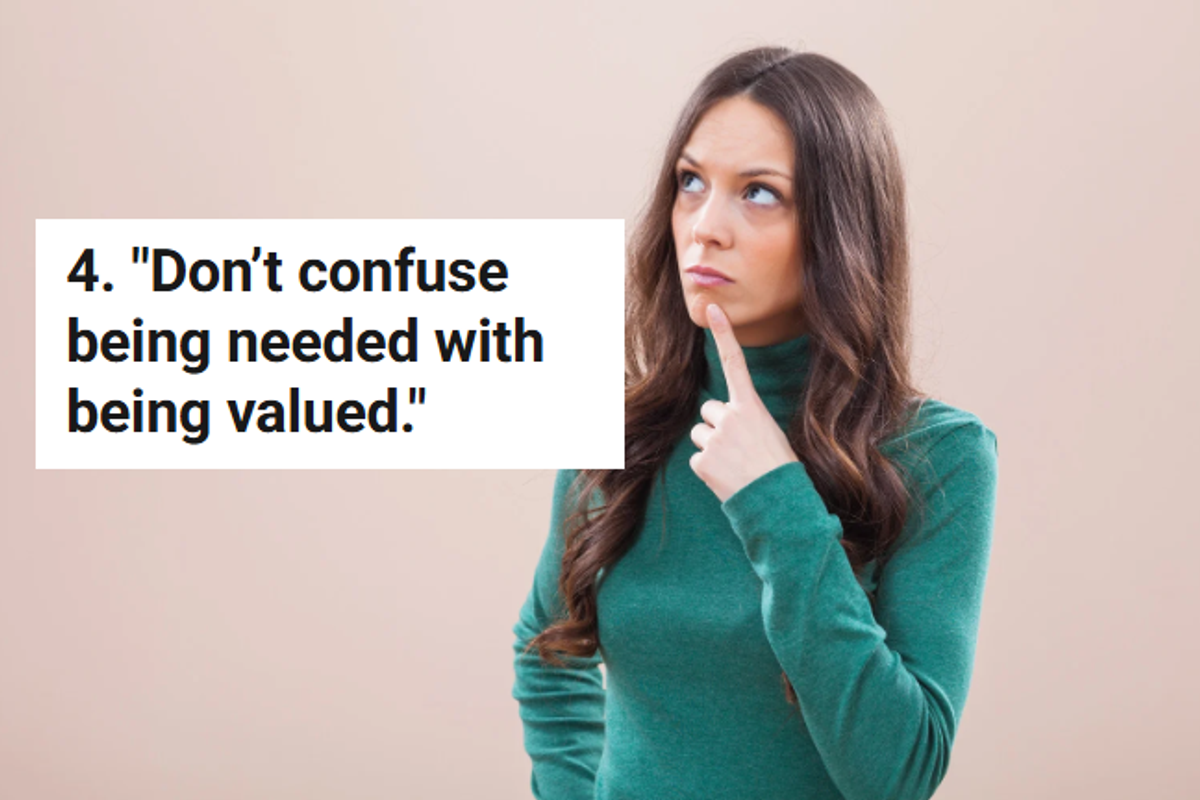15 people share the life-changing phrase they heard once, and it stuck with them forever
"Don't confuse being needed with being valued."
A woman thinking to herself.
Ever have a moment in your life when someone told you something wise that you’ve never heard before, and it felt like time stopped? You feel so grateful to have the wisdom, but at the same time, sad because you wish you had heard it earlier and avoided some of life's unnecessary trials and tribulations.
One of the primary reasons we remember some things people tell us and forget others is emotion. When we experience an emotional reaction to information, the brain perceives it as valuable and stores it in long-term memory. That’s probably why it’s easy to remember the lyrics to the songs we love. The words are combined with an emotional change created by the melody in which they are sung and the accompanying music.
A Reddit user asked people on the AskReddit subforum to share the phrases they “heard only once but it stayed with you forever,” and it inspired a wonderful conversation where people shared the timeless wisdom that they will never forget. Many of the phrases revolved around healthy ways to deal with relationships, making sense of inner dialogues, and how to change, even when it feels impossible.

Here are 15 of the most inspiring quotes that people “heard only once,” but they have stayed with them forever.
1. "You can't un-ring a bell."
"My high school history teacher told us - speak carefully to others, you can't un-drive the nail, the hole will always remain. Someone may forgive you, but the damage is done, the hole will remain."
"The axe forgets, but the tree remembers."
2. “You don’t have to attend every argument you’re invited to.”
"I cannot tell you how many times over the last few years I have had to stop and physically tell myself, that it's not my job to make sure anyone understands anything. Helped me put down my phone a number of times and just breath."
"The best thing to learn early in life is to walk away. Some ppl actually think they won the argument because I walked away. I feel like I won because I walked away."
3. "Sometimes, a man on the right track gets hit by a train on the wrong one."
4. "Don’t confuse being needed with being valued."

5. "Not everyone you lose is a loss."
"This is good advice, especially for people going through a life change (e.g., growing up, moving, graduating, switching jobs, etc). A lot of people have drifted out of my life over the years, and a lot more made me sad at the time than were actually worth getting sad about. A few departures might've even been worthy of celebration, but it didn't feel that way in the moment."
"As I grow older, I've realized a very important skill for my own mental health is being able to cherish and appreciate the person someone was, and even love them, while also appreciating some extra distance between our present selves."
6. "Don't believe everything you think."
"I needed this. Having some hang-xiety from this weekend on how I’m a total weirdo & I need to learn to stfu more. But I know the reality is I just opened up and made new friends."
"Having worked with and known people with mental health struggles, I will say, 'A (depressed or mentally unwell) brain is a liar. It will tell you things that aren’t true. Keep a list of what is real and the facts that support it."
7. "No matter how far down the wrong road you are... turn around."
"The longer it takes you to get off the bus, the more expensive the return ticket will be."
"When you realize you are in a hole, stop digging."

8. "The way you talk to / scold your kids is the voice and tone they will learn to talk to themselves in."
"Similarly, I've read, 'Your anger becomes their anxiety.' As a new mom who was raised by an angry father and struggles with anxiety, it is a perspective I'm glad I came upon early. It has redirected both how I speak to her and what I'll allow her to be exposed to."
"God, I feel that. My parents were basically always angry and/or annoyed."
9. "You are under no obligation to set yourself on fire to keep someone else warm."
"That one always makes me think of something my therapist said: 'You didn’t ask to be born. Your parents wanted a child and you have lived to fulfil their wants and needs for twenty years. You’re allowed to live for yourself now.'"
10. “If you don’t ask, the answer will always be no.”
"You miss 100% of the shots you don't take in a different form."
11. "Grief is just love with nowhere to go."
"There have been a few similar phrases about grief that have stuck with me:
And "But what is grief but love persevering.'
Both tore me to pieces and have stuck with me as I've lost people close to me."
12. "The time will pass either way."
"My old boss used to say, 'I wish you well and I wish you away.'"
14. "In the absence of communication, the void is filled with negativity."
15. "Don't let 'perfect' be the enemy of progress."
- Young dad tearfully seeks advice on going from one child to two and gets the best advice ›
- The best parenting advice I've read in a long time: Someone will always criticize you. ›
- People are sharing the 'best advice they ever received' and it's simple but powerful ›
- People are sharing the marriage advice that 'sounded absurd' but is actually really helpful ›
- 14 books that rewired people’s brains and completely changed the way they see the world - Upworthy ›




